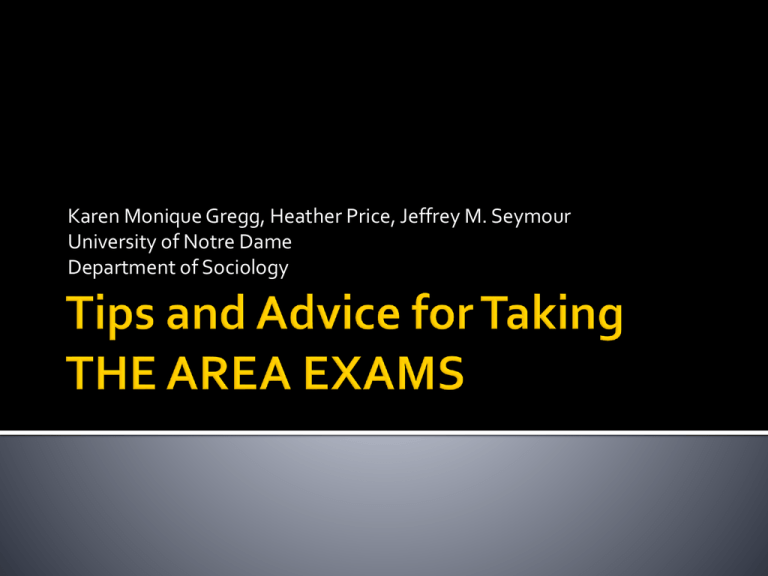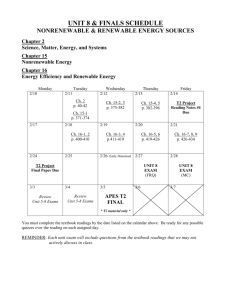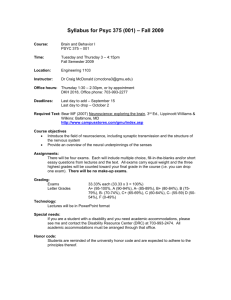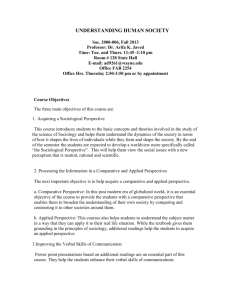Tips and Advice for Taking THE AREA EXAMS
advertisement

Karen Monique Gregg, Heather Price, Jeffrey M. Seymour University of Notre Dame Department of Sociology NOT ALL AREA EXAMS ARE CREATED EQUALLY Investigate the exams Know the Committee members Think about the models offered (they vary widely) Find out what kind of preparation is required for each exam Talk to others who have recently taken the exam Which one do you think fits YOU the best? Does this fit what YOU want to develop knowledge in? ▪ Some exams allow you to tailor the exam to your interest ▪ Others don’t ▪ DETERMINE whether or not this is important to you when deciding which exam to take Decide now what exams you will take! The sooner the better! Make every class relevant to these exams Don’t waste time taking courses that will not inform your thoughts for taking these exams Take summary notes of all readings for every class. This helps you practice writing and helps prepare for the exam ▪ Also serves as easy reference later when you study (drum roll please) READ THIS FIRST – Check it often for changes! http://sociology.nd.edu/graduateprogram/areaexaminformation/ Going it alone! As soon as you decide which area exam you are taking… Declare your interest – e-mail the Chair of the exam to request a meeting ▪ Before the meeting read the Graduate Guide – know what you should expect from this experience Check to make sure the Chair doesn’t change after this meeting (in Summer months committees change) Make arrangements for how the Chair will guide you in your preparation ▪ WIDE VARIATION ON THIS – several models Set a date (may be more structured now) – tell Pat Kipker How will the exam be graded? How long will it take to get the results? How will I be informed of the results? What will happen then? Will you work with me on papers in the area? How important are citations? What does “Passing with Distinction” look like? What does just “Passing” look like? If someone were to fail, why would they fail? After you have met with the Chair… Start amassing the material you will need for studying. ▪ Buy books (strongly recommend – making a commitment to the field) ▪ If you don’t buy the books at least copy the relevant portions for future reference ▪ Print the articles and organize them into topics This takes a lot of time (and money) – start early! GET copies of past exams from Pat Kipker! Study the questions – look for patterns! If other students are comfortable, you’re allowed to consult students' past answers and resources – MUST GET THEIR PERMISSION Buy a calendar! Set a schedule! Be disciplined! Read in Chunks and Write in Chunks Broad themes in the literature ▪ Where are the strengths? ▪ Where are the weaknesses? ▪ Know the history of the area you are studying ▪ What shifts occurred in the field? ▪ How did this change intellectual trajectories? ▪ Why does any of that matter? Divide the readings into areas/sections After each reading – write a one page summary in your own words (RQ, method, findings, your reaction) After reading the area – try to write a compendium of the readings. (6-12 pages) Read, read, read these – especially the two weeks before the EXAM. Practice typing! You will type as fast as you can for four hours (without stopping much) so your hands need to be ready for this! Think of it as a finger marathon that you have to train for! As the date approaches – you may realize that you aren’t going to finish all the material – may need to strategize! As you approach the exam… You will experience anxiety (face it) Use this to your advantage! Don’t let it defeat you! Use it to motivate you to work harder and longer and to think deeper about the BIG PICTURE of the field! Don’t panic! Get practical advice from others who have taken the same exam. There will come a point where you think, “That’s it.” So just relax and count on the fact that you’ve done all that you could (humanly) possibly do to prepare – given the limitations of the exam you are taking. In the six months following PASSING the exam… START WRITING ACADEMIC PAPERS Take advantage of the knowledge you have accumulated Where were there holes in the field? What kinds of contributions do you want to make? What kind of scholar do you want to be? Know your strengths and weaknesses Know your actual personality, not your ideal Know the personalities of the possible people in the group Be realistic about how your personality will intersect with the others Even ask someone for an outside assessment Know you can always drop out of the group PROS Helps keep you ontask Provides you a place to talk out your learning Provides consensus CONS Off-task talking when together Gathering times can be burdensome Opinions can conflict PROS Sense of security CONS Feeling inadequate and stupid Maximizes amount of Can become literature you can master overwhelming Gives you people to talk Can become ‘groupy’ with about your emotional weird ride through exams Organize, organize, organize Set a standing meeting time Set a reading schedule ▪ Outline necessary readings for the exam ▪ Set reading goals between meetings ▪ Discuss the readings in the meeting Outline the entire calendar between the first and last day of the studying period Discuss what will occur in meetings; set an agenda Maximize the Pros Utilize all the knowledge base in the group ▪ All should contribute to the ‘master reading list’ ▪ Use everyone’s old class syllabi to build a baseline list Outline meeting agenda ▪ Set start and end times ▪ Talk out the readings ▪ Discuss disagreements ▪ Reach some consensus Minimize the Cons Stick to the meeting agenda Be flexible with meeting times Everyone does their part ▪ Don’t drag someone along! Schedule in some emotional talking time ▪ This keeps everyone considerate, but bounded Set the agenda with time constraints Ask questions about the readings Discuss the readings’ main points Discuss disagreements Reach consensus or table the question and remember to readdress it after more readings Connect works to past readings Find old exam questions which could use this information and talk it out together Two heads (or 3, 4, 5) are better than one Many hands lighten the load “the ability to interact with professional peers on the basis of shared knowledge and understanding; the ability to teach in the field and to organize a new syllabus; the ability to develop original research questions” 1) 2) 3) Graduate Guide http://sociology.nd.edu/graduate-program/resources/documents/guide-tograduate-studies-8-2008.pdf Culture Met weekly with exam chair to go over readings Stats and Methods Only met with exam chair when I had specific questions Didn’t have a reading list Developed my own reading list with help from exam committee Developed my own questions Questions were created with help from exam chair and chosen by exam committee Culture Stats and Methods No flexibility in which questions I could answer on exam day Exam looked for my insight and critique via semi-original answers Flexibility in which questions I could answer on exam day Exam looked for mastery and application of material Complete preparation for the entire field Prepare for everything on the area’s exhaustive reading list Know what’s coming Because some areas allow you to design the questions, work on preparing your original responses Hedge your bets Look at past tests and pull out frequent questions and themes Get to know your committee No matter how you prepare, it might be good to know about your committee members’ specific academic interests It happens Less than 10% of students will not pass an exam Re-writes, re-takes, and moving on to a new area Meet with your exam chair, advisor, and DGS to talk about your options if you don’t pass your first exam Check your exam’s specific policies before taking the exam ▪ http://sociology.nd.edu/graduate-program/areaexaminformation/ What happens if you don’t pass again? Failing two full exams results in termination from the program Manage your time You only get four hours each day Outline the plan Get your basic idea on paper as quickly and as clearly as you can Don’t get bogged down by little details Mark your exam if you have to come back to an idea Cite as best you can (or as much is required) If you can’t remember, put down what you know Bring snacks and earplugs Monique: Soc Psych & Religion Heather: Stats and Methods & Soc of Educ Jeff: Stats and Methods & Cultural Soc All these exams are different: - Different formats - Different styles - Different goals Thank you for coming!







